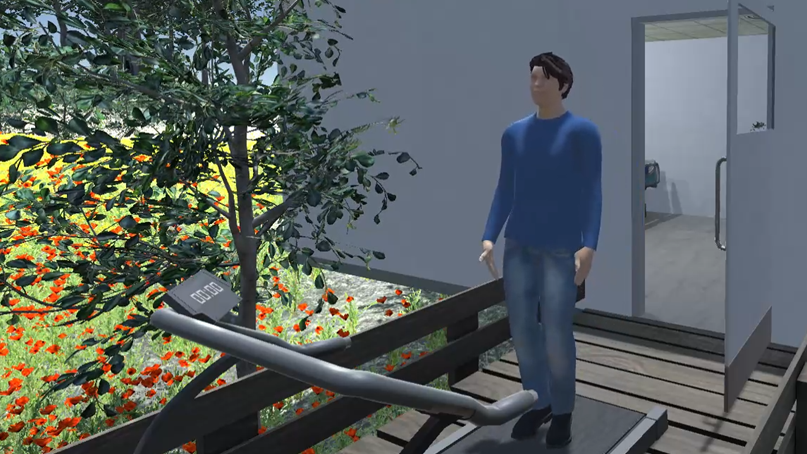After hospitalization in ICU, about 50% of patients develop neuromyopathy, i.e. damage to nerves and muscles as a result of immobilization and the treatments used. Amongst patients affected by Covid-19 and hospitalized in ICU for several weeks, this pattern is similar or even higher. Neuromyopathy will delay their return to walking, their discharge from hospital and may reduce their autonomy in daily life. Virtual reality (VR) environments are already used for the assessment and rehabilitation of patients with neurological diseases, and they have proved their worth. Therefore, it seems appropriate to propose the use of virtual environments for this new type of use and consequently for the rehabilitation of Covid-19 patients.
With VERARE, the patient will be immersed in different virtual environments using a VR headset. He will be represented by an avatar, his virtual alter ego. He will see himself carrying out different motor tasks involving his lower limbs; for example, walking, jogging, avoiding obstacles, etc. We ask the patient to observe these actions and then imagine that he or she is performing them in the virtual environment. Our main hypothesis is that the observation of virtual actions, such as walking, and the progressive resumption of motor activity in VR, will allow a quicker start to rehabilitation, as soon as the patient leaves the ICU. The patient will then be able to carry out sessions in his room, or even from his hospital bed, in simple and secure conditions, hoping to obtain a final clinical benefit, either in terms of motor and walking recovery or in terms of hospital length of stay. This is a very innovative project, because to our knowledge virtual reality has never been used at this stage of patient care and for this type of rehabilitation in intensive care or physical and rehabilitation medicine departments.
Learders
- Anatole Lecuyer, Inria researcher and leader of Hybrid research team (common with Inria, CNRS, Université de Rennes 1 and INSA Rennes).
- Yoann Launey, anaesthetist physician in surgical intensive care unit at Rennes University Hospital.
- Mélanie Cogné, Physician of Physical and Rehabilitation Medicine, University and University Hospital of Rennes.
Partners: Inria and CHU Rennes



